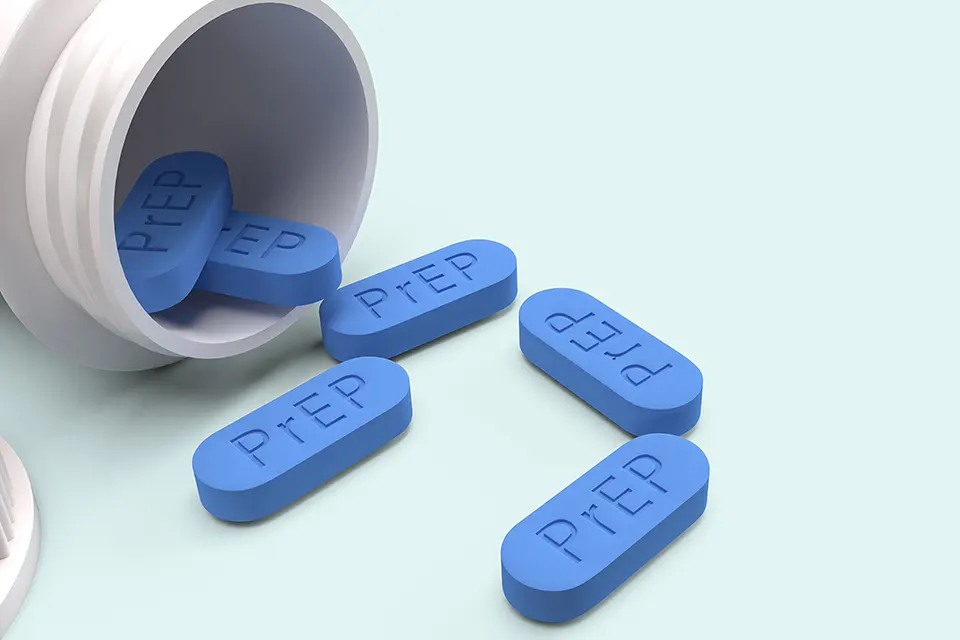What the medication is used for:
GENERIC TRUVADA is a type of medicine called an HIV (human immunodeficiency virus) nucleoside analog reverse transcriptase inhibitor (NRTI). GENERIC TRUVADA contains 2 medicines, EMTRIVA (emtricitabine) and VIREAD (tenofovir disoproxil fumarate, or tenofovir DF) combined in one pill.
GENERIC TRUVADA is used:
- To treat HIV-1 Infectionwhen used with other anti-HIV medicines in adults. OR
- To help reduce the risk of getting HIV-1 infectionwhen used with safer sex practices in:
- HIV-1 negative men who have sex with men, who are at high risk of getting infected with HIV-1 through sex.
- Male-female sex partners when one partner has HIV-1 infection, and the other does not.
This is sometimes called Pre-Exposure Prophylaxis or PrEP. GENERIC TRUVADA is for adults age 18 and older. GENERIC TRUVADA is not indicated in children under age 18 or adults over age 65.
What it does:
- Use of GENERIC TRUVADA to treat HIV-1 infection:When used with other HIV-1 medicines to treat HIV-1 infection, GENERIC TRUVADA helps block HIV reverse transcriptase, a chemical in your body (enzyme) that is needed for HIV to multiply. GENERIC TRUVADA lowers the amount of HIV in the blood (viral load). Lowering the amount of HIV in the blood lowers the chance of infections that happen when your immune system is weak (opportunistic infections).
HIV infection destroys CD4+ (T) cells, which are important to the immune system. The immune system helps fight infection. After a large number of T cells are destroyed, acquired immune deficiency syndrome (AIDS) develops. GENERIC TRUVADA may also help to increase the number of T cells (CD4+ cells).
GENERIC TRUVADA does not cure HIV-1 infection or AIDS. If you have HIV-1 infection, you must stay on continuous HIV therapy to control HIV infection and decrease HIV-related illnesses. People taking GENERIC TRUVADA may still get opportunistic infections or other conditions that happen with HIV infection. Opportunistic infections are infections that develop because the immune system is weak. Some of these conditions are pneumonia, herpes virus infections, and Mycobacterium avium complex (MAC) infections.
- Use of GENERIC TRUVADA to reduce the risk of HIV-1 infection (PrEP indication): When used with safer sex practices, GENERIC TRUVADA may help to reduce the risk of getting HIV-1 infection:
- GENERIC TRUVADA works better to reduce the risk of getting HIV-1 when the medicines are in your bloodstream beforeyou are exposed to HIV-1.
It is very important that you see your healthcare professional regularly while taking GENERIC TRUVADA.
Considerations when GENERIC TRUVADA is used for PrEP:
- Together with your healthcare professional, you need to decide whether GENERIC TRUVADA is right for you.
- GENERIC TRUVADA can only help reduce your risk of getting HIV-1 before you are infected.
- Do not take GENERIC TRUVADA to help reduce your risk of getting HIV-1 if:
- you already have HIV-1 infection. If you are HIV-1 positive, you need to take other medicines with GENERIC TRUVADA to treat HIV-1. GENERIC TRUVADA by itself is not a complete treatment for HIV-1.
- you do not know your HIV-1 infection status. You may already be HIV-1 positive. You need to take other HIV-1 medicines with GENERIC TRUVADA to treat HIV-1.
- Your healthcare professional will run tests to determine that you are HIV-negative before starting PrEP treatment.
When it should not be used:
Do not use GENERIC TRUVADA if:
- You are allergic (hypersensitive) to any of the ingredients in this formulation.
- Do not use GENERIC TRUVADA to reduce the risk of getting HIV if you already have HIV or do not know your HIV status.
What the medicinal ingredients are:
Emtricitabine, tenofovir disoproxil fumarate (tenofovir DF)
Warnings and Precautions:
Serious Warnings and Precautions
- The most serious possible side effect is harm to the kidneys, including damage to kidney cells, kidney tissue inflammation and kidney failure. Your healthcare professional may monitor your kidney function before beginning and while receiving GENERIC TRUVADA. Some patients treated with tenofovir DF (a component of GENERIC TRUVADA) have had kidney problems. Your healthcare professional may need to perform additional blood tests if you have had kidney problems in the past or need to take another drug that can cause kidney problems.
- If you are also infected with the Hepatitis B Virus, “flare-ups” of Hepatitis B Virus infection, in which the disease suddenly returns in a worse way than before, can occur if you stop taking GENERIC TRUVADA. Do not stop taking GENERIC TRUVADA without your healthcare professional’s advice. If you stop taking GENERIC TRUVADA, tell your healthcare professional immediately about any new, unusual or worsening symptoms that you notice after stopping treatment. After you stop taking GENERIC TRUVADA, your healthcare professional will still need to check your health and take blood tests to check your liver for several months. GENERIC TRUVADA is not approved for the treatment of Hepatitis B Virus infection.
- The class of medicines to which GENERIC TRUVADA belongs (NRTIs) can cause a condition called lactic acidosis, together with an enlarged liver. Non-specific symptoms such as nausea, vomiting and stomach pain might indicate the development of lactic acidosis. This rare but serious side effect has occasionally been fatal. Lactic acidosis occurs more often in women, particularly if they are very overweight. You should consult your healthcare professional immediately if such symptoms occur while you are receiving GENERIC TRUVADA. The symptoms that may indicate lactic acidosis include: feeling very weak, tired or uncomfortable; unusual or unexpected stomach discomfort; feeling cold; feeling dizzy or lightheaded; suddenly developing a slow or irregular heartbeat. If you notice these symptoms, stop taking GENERIC TRUVADA and consult a healthcare professional immediately.
- Tenofovir DF caused harm to the bones of animals. Tenofovir DF reduced bone density in humans. If you notice bone pain, or suffer a bone fracture, or other bone problem, consult your healthcare professional. If you have bone problems, you may wish to discuss calcium and/or vitamin D supplements with your healthcare professionals.
- GENERIC TRUVADA should only be used for the PrEP indication if you are HIV-negative before and during treatment. Discuss with your healthcare professional if you have had a recent flu-like illness. Your healthcare professional will run tests to confirm that you are HIV negative before and during GENERIC TRUVADA treatment.
Do NOT take GENERIC TRUVADA if:
- you are on other medications that may affect your kidneys and have not discussed this with your healthcare professional.
- you have or are at known risk for any type of bone disease or bone related problems and have not discussed this with your healthcare professional.
- you are allergic to GENERIC TRUVADA or any of its ingredients. The medicinal ingredients are emtricitabine and tenofovir DF.
- you are already taking 3TC, ATRIPLA, Combivir, COMPLERA, DESCOVY, EMTRIVA, GENVOYA, ODEFSEY, Heptovir, Kivexa, STRIBILD, Triumeq, Trizivir, VEMLIDY, or VIREAD because these medicines contain the same or similar active ingredients
- you are also taking HEPSERA to treat your HBV infection
Changes in your immune system (Immune Reconstitution Inflammatory Syndrome) can happen when an HIV-1 infected person starts taking HIV medicines. Your immune system may get stronger and begin to fight infections that have been hidden in your body for a long time, or you could develop an autoimmune disease in which your immune system reacts against your own body [e.g. Graves’ disease (which affects the thyroid gland), Guillain-Barré syndrome (which affects the nervous system) or polymyositis (which affects the muscles)] and it may develop at any time, sometimes months later after the start of HIV therapy. Sometimes symptoms can be severe, so if you develop high temperature (fever), joint or muscle pain, redness, rash, swelling or fatigue, or any new symptoms, contact your healthcare professional right away.
Before taking GENERIC TRUVADA to reduce your risk of getting HIV-1 infection (PrEP indication):
- You must get tested to be sure you are HIV-negative.It is important that you also get tested at least every 3 months as recommended by your healthcare provider while taking GENERIC TRUVADA. Do not take GENERIC TRUVADA to reduce the risk of getting HIV (PrEP) unless you are confirmed to be HIV-negative.
- Tell your healthcare provider if you have any of the following symptoms within the last month before you start taking GENERIC TRUVADA or at any time while taking GENERIC TRUVADA:
- tiredness
- fever
- sweating a lot (especially at night)
- rash
- vomiting or diarrhea
- joint or muscle aches
- headache
- sore throat
- enlarged lymph nodes in the neck or groin
These may be signs of HIV infection and you may need to have a different kind of test to diagnose HIV. If you are already taking GENERIC TRUVADA to prevent HIV-1 infection (PrEP), your healthcare provider may tell you to stop taking GENERIC TRUVADA until an HIV test confirms that you do not have HIV-1 infection. For more information on GENERIC TRUVADA for PrEP, log onto www.generic Truvada.ca.
Just taking GENERIC TRUVADA may not keep you from getting HIV. GENERIC TRUVADA does NOT always prevent HIV.
You must still practice safer sex at all times. Do not have any kind of sex without protection. Always practice safer sex by using a latex or polyurethane condom to lower the chance of sexual contact with semen, vaginal secretions, or blood.
You must also use other prevention methods to keep from getting HIV.
- Know your HIV-1 status and the HIV-1 status of your partners.
- While taking GENERIC TRUVADA, get tested at least every 3 months for HIV, as recommended by your healthcare provider. Ask your partners to get tested.
- If you think you were exposed to HIV-1, tell your healthcare provider right away. They may want to do more tests to be sure you are still HIV-negative.
- Get tested for other sexually transmitted infections such as syphilis and gonorrhea. These infections make it easier for HIV to infect you.
- Get information and support to help reduce risky sexual behavior.
- Have fewer sex partners.
- Do not miss any doses of GENERIC TRUVADA. Missing doses may increase your risk of getting HIV-1 infection.
BEFORE you use GENERIC TRUVADA (emtricitabine/tenofovir DF) talk to your healthcare professional:
If you are pregnant or planning to become pregnant:
Pregnant mothers should not take GENERIC TRUVADA unless specifically directed by the healthcare professional.
If you are a female who is taking GENERIC TRUVADA to prevent HIV infection (PrEP) and you become pregnant while taking GENERIC TRUVADA, talk to your healthcare provider about whether you should continue taking GENERIC TRUVADA.
Pregnancy Registry:
There is a pregnancy registry for women who take antiviral medicines during pregnancy. The purpose of this registry is to collect information about the health of you and your baby. Talk to your healthcare provider about how you can take part in this Antiretroviral Pregnancy Registry.
If you are breastfeeding or planning to breastfeed:
Do not breastfeed if you are taking GENERIC TRUVADA or have HIV. Emtricitabine and tenofovir DF, the two components of GENERIC TRUVADA, pass to your baby in your breast milk. You should not breast-feed because of the risk of passing HIV to your baby. Talk to your healthcare professional about the best way to feed your baby.
If you have other medical conditions:
Let your healthcare professional know if you have other medical conditions, especially liver, bone and kidney problems.
If you are taking other medicines:
Some medicines can interact when taken together, including prescription and non-prescription medicines and dietary supplements.
If you are taking didanosine:
Taking didanosine and GENERIC TRUVADA may cause serious reactions including lactic acidosis (too much acid in the blood), pancreatitis (inflamed pancreas) and nerve damage (neuropathy)
GENERIC TRUVADA should not be used with or soon after cidofovir, acyclovir, valacyclovir, ganciclovir, valganciclovir, aminoglycosides, or nonsteroidal anti-inflammatory drugs (NSAIDS), due to potential harm to the kidneys.
It is a good idea to keep a complete list of all the medicines that you take. Make a new list when medicines are added or stopped. Give copies of this list to all of your healthcare providers every time you visit your healthcare professional or fill a prescription.
Other Special Warnings:
Your blood sugar levels (glucose) or levels of fats (lipids) in your blood may increase with HIV treatment. Your doctor may order blood tests for you.
Interactions with This Medication:
Let your healthcare professional know if you are taking these or any other medications:
- Drugs that contain didanosine (Videx, Videx EC). Tenofovir DF (a component of GENERIC TRUVADA) may increase the amount of Videx in your blood. You may need to be followed more carefully if you are taking GENERIC TRUVADA and Videx together. Also, the dose of didanosine may need to be reduced.
- Reyataz (atazanavir sulfate), Kaletra (lopinavir/ritonavir), Prezista (darunavir), HARVONI (ledipasvir/sofosbuvir), EPCLUSA (sofosbuvir/velpatasvir) or VOSEVI (sofosbuvir/velpatasvir/voxilaprevir). These medicines may increase the amount of tenofovir DF (a component of GENERIC TRUVADA) in your blood, which could result in more side effects. You may need to be followed more carefully if you are taking GENERIC TRUVADA together with Reyataz, Kaletra, Prezista, HARVONI, or EPCLUSA or VOSEVI. GENERIC TRUVADA may decrease the amount of Reyataz in your blood. If you are taking GENERIC TRUVADA and Reyataz together, you should also be taking Norvir (ritonavir).
- Non-steroidal anti-inflammatory drugs.
Proper Use of This Medication:
Stay under a healthcare professional’s care when taking GENERIC TRUVADA. Do not change your treatment or stop treatment without first talking with your healthcare professional.
Take GENERIC TRUVADA exactly as your healthcare professional prescribed it. Follow the directions from your healthcare professional, exactly as written on the label. Set up a dosing schedule and follow it carefully.
When used to treat HIV-1 infection, GENERIC TRUVADA is always used with other HIV-1 medicines.
If you take GENERIC TRUVADA to reduce your risk of getting HIV-1:
- you must also use other methods to reduce your risk of getting HIV.
- take GENERIC TRUVADA every day, not just when you think you have been exposed to HIV-1.
Avoid doing things that can increase your risk of getting HIV infection or spreading HIV infection to other people:
- Do not re-use or share needles or other injection equipment.
- Do not share personal items that can have blood or body fluids on them, like toothbrushes and razor blades.
- Do not have any kind of sex without protection. Always practice safer sex by using a latex or polyurethane condom to lower the chance of sexual contact with semen, vagina secretions, or blood.
Ask your healthcare provider if you have any questions on how to prevent getting HIV infection or spreading HIV infection to other people.
When your GENERIC TRUVADA supply starts to run low, get more from your healthcare professional. This is very important because the amount of virus in your blood may increase if the medicine is stopped for even a short time. The virus may develop resistance to GENERIC TRUVADA and become harder to treat.
Only take medicine that has been prescribed specifically for you. Do not give GENERIC TRUVADA to others or take medicine prescribed for someone else.
Do not use if seal over bottle opening is broken or missing.
Usual adult dose:
For the treatment of HIV-1 infection:
- The usual dose of GENERIC TRUVADA is one tablet orally (by mouth) once a day, in combination with other anti-HIV medicines.
- GENERIC TRUVADA may be taken with or without a meal.
For prevention of HIV-1 infection (PrEP):
- The usual dose of GENERIC TRUVADA is one tablet orally (by mouth) once a day.
- GENERIC TRUVADA may be taken with or without a meal.
Overdose:
In case of drug overdose, contact your healthcare professional, hospital emergency department or Regional Poison Control Centre, even if there are no symptoms.
Missed dose:
It is important that you do not miss any doses. If you miss a dose of GENERIC TRUVADA and it is less than 12 hours from the time you usually take GENERIC TRUVADA, then take the dose. If more than 12 hours has passed from the time you usually take GENERIC TRUVADA, then wait until the next scheduled daily dose. Do not take more than 1 dose of GENERIC TRUVADA in a day.Do not take 2 doses at the same time. Call your healthcare professional if you are not sure what to do.
Side Effects and What to Do About Them:
The most common side effects of GENERIC TRUVADA are:
- Diarrhea
- Nausea
- Vomiting
- Dizziness
- Headache
Other side effects include:
- Stomach pain
- Indigestion
- Inflammation of the pancreas
- Sleeping problems
- Abnormal dreams
- Weakness
- Pain
- Shortness of breath
- Allergic reaction (including swelling of the face, lips, tongue or throat)
- Rash
- Flatulence (intestinal gas)
- Skin discoloration (small spots or freckles) may also happen with GENERIC TRUVADA
Lactic acidosis is a medical emergency and must be treated in the hospital. You may be more likely to get lactic acidosis or serious liver problems if you are very overweight (obese) or have been taking nucleoside analog medicines, like GENERIC TRUVADA, for a long time.
Muscle pain, muscle weakness, bone pain and softening of the bone (infrequently contributing to fractures) have also been reported.
There have been other side effects in patients taking EMTRIVA or VIREAD. This is not a complete list of side effects. If you have questions about side effects, ask your healthcare professional. You should report any new or continuing symptoms to your healthcare professional right away. Your healthcare professional may be able to help you manage these side effects.
How to Store It:
- Keep GENERIC TRUVADA and all other medications out of reach and sight of children.
- GENERIC TRUVADA should be stored at 15-30°C. It should remain stable until the expiration date printed on the label.
- Do not keep your medicine in places that are too hot or cold.
- Do not keep medicine that is out of date or that you no longer need. If you throw any medicines away, make sure that children will not find them.
- Keep GENERIC TRUVADA in its original container and keep the container tightly closed.






